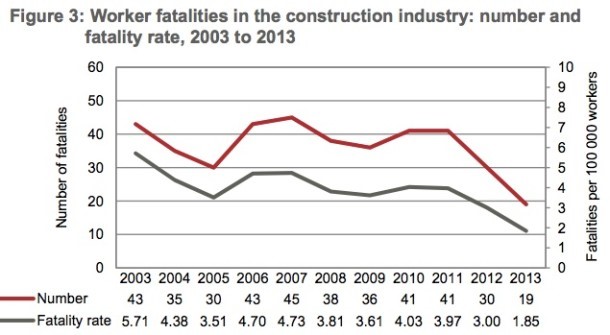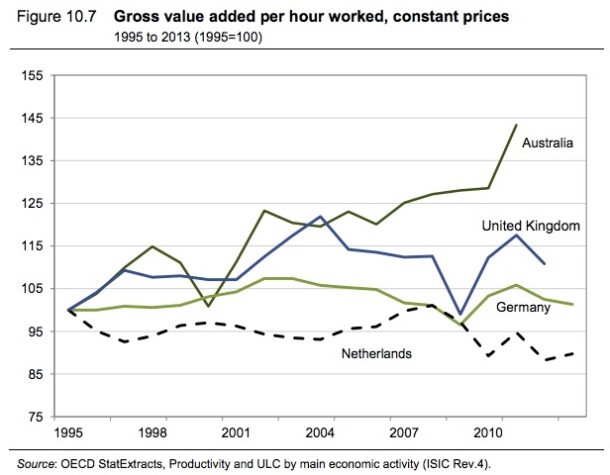Search
Democracy Links
Member's Off-site Blogs
fashioning democracy with fascism ...

The Building and Construction Industry (Improving Productivity) Bill 2013 (No. 2), reintroduced yesterday by the government, is a remarkable assault on some of the most basic rights Australians take for granted: the right to silence, the right to legal representation, the right against self-incrimination, the right to tell someone you've been interrogated against your will by overreaching bureaucrats. All of these are aimed at one union, the CFMEU, although the ABCC's reach will extend to other sectors like transport and manufacturing. And as we know from past experience, the ABCC in its former Howard-era incarnation is ready to use those powers, even against people with no role or interest in the construction industry who happen to be in the wrong place at the wrong time. Worse, some of its powers were exercised illegally.
This suite of powers, which is comparable in impact to the counter-terrorism powers wielded by security agencies in the so-called War on Terror, are justified by the government and employers on the basis claims of lawlessness and thuggery in the construction industry. But more specifically, it's about lifting the productivity of the construction industry - after all, that's the name of the bill. The explanatory memorandum for the current bill states:
"While the ABCC existed, the performance of the building and construction sector improved. For example, industry productivity improved, Australian consumers were better off and there was a significant reduction in days lost through industrial action."
You'd expect there to be a strong basis of evidence for giving draconian powers to such a body above and beyond the normal powers of Commonwealth and state police forces and courts, as well as the current Building Inspectorate within Fair Work Australia, which has specific powers of access and information-gathering. After all, those who want to reduce our rights should bear the burden of demonstrating why it is necessary. So how does the evidence for the need for such additional powers for a new ABCC stack up?
On industrial action, it's impossible to confirm the government's claims using independent data from the ABS. Its industry-specific industrial disputation data only goes back to 2008. We do know that, overall, the current level of industrial disputation is at historic lows, but that doesn't tell us much about construction. The original ABCC was established in 2005 and abolished in 2012, although its period of operation as a specifically anti-CFMEU entity finished in 2010, when Coalition favourite and industrial relations hardliner John Lloyd was replaced with Leigh Johns, under whom the ABCC began showing interest in other problems like sham contracting and tax avoidance rather than single-mindedly pursuing the CFMEU.
Then in opposition, the Coalition accused Labor of "neutering" the ABCC; Johns was attacked by Senator Eric Abetz for being a former ALP member. Johns has since been accused by former ABCC executive, current Building Inspectorate head and likely head of a new ABCC, Nigel Hadgkiss, of doing deals with the CFMEU. In 2011, Lloyd also attacked his successor, accusing him of deflecting the ABCC from its core mission in favour of pursuing "trendy issues" like sham contracting.
What we do know from the ABS data is that the average annual level of days lost per thousand employees in the construction industry increased significantly from 2008 to 2012 -- but then fell back to near previous levels in 2013 and 2014. So far this year the level of days lost is well below mining - although mining is another area of CFMEU presence. But overall, days lost per thousand employees in construction is around six times the level of the overall economy.
So whether the level of disputes has gone up or not, construction does have more industrial disputation - although the CFMEU would argue that's because it's one of Australia's most dangerous industries. Safe Work Australia data shows construction is the third most dangerous industry, after agriculture and transport. Moreover, as Safe Work data also shows, under Howard's ABCC, workplace fatalities in the construction industry rose significantly, but they fell again once the ABCC was "neutered", reflecting how the Lloyd-era ABCC's goal was to gut the CFMEU rather than protect workers.

What about productivity? Fortunately we can turn to the Productivity Commission's 2014 study of the construction industry as part of its exhaustive report on infrastructure (the relevant volume is here). Here, the government story comes a cropper. The PC found:
"Productivity growth in the Australian construction sector has ebbed and flowed over the last 30 years. There was a significant increase in labour and multifactor productivity from 1994-95 to 2012-13. However, most of the improvement was concentrated in relatively short bursts spanning just a few years, including most recently in 2011-12."
That doesn't fit at all with the government's claims - particularly given productivity surged after the ABCC was "neutered" and distracted by "trendy" issues from 2010. The PC also noted that Australia fared well in international comparisons, although getting like-for-like data was difficult and more work was needed. But what evidence there is fits poorly with the government narrative:

What about costs? Employer groups and business are continually lamenting how construction in Australia is expensive compared internationally. The PC found evidence:
"There have been some recent significant increases in input costs, particularly labour and fuel costs ... International comparisons of costs between Australia and counterpart countries are largely inconclusive, but do not support some recent claims (such as those made in BCA 2013) of very large cost differentials."
That "BCA 2013" reference, by the way, is to a report that Crikey demolished when the Business Council published it a couple of years ago. But the PC also noted that more recent data show softer labour market conditions that would reduce labour cost pressures in the industry.
And ABS wage price index data reflects this: in the three years to the September quarter 2015, private construction industry wage costs slowed significantly from previous years and grew more slowly than wages in manufacturing, retailing, real estate and education - in fact, construction industry wages grew marginally below the average across all sectors.
So construction industry wage costs aren't growing any faster than the rest of the economy despite claims about CFMEU thugging employers, and productivity surged after the "neutering" of the ABCC. Only on industrial disputation do the stats back the "rogue union" line, but given the high stakes in terms of workplace injury and fatality - and the fact that the restoration of the ABCC may result in a rise in workplace deaths - that may reflect unsafe workplaces as much as union militancy.
It's on such weak foundations that the Coalition is launching a major attack on civil liberties and targeting one organisation. Evidence-based policy it isn't.
- By John Richardson at 4 Feb 2016 - 12:26pm
- John Richardson's blog
- Login or register to post comments
Recent comments
1 hour 18 min ago
1 hour 50 min ago
2 hours 48 min ago
2 hours 52 min ago
4 hours 35 min ago
4 hours 46 min ago
4 hours 50 min ago
4 hours 57 min ago
17 hours 12 min ago
21 hours 39 min ago